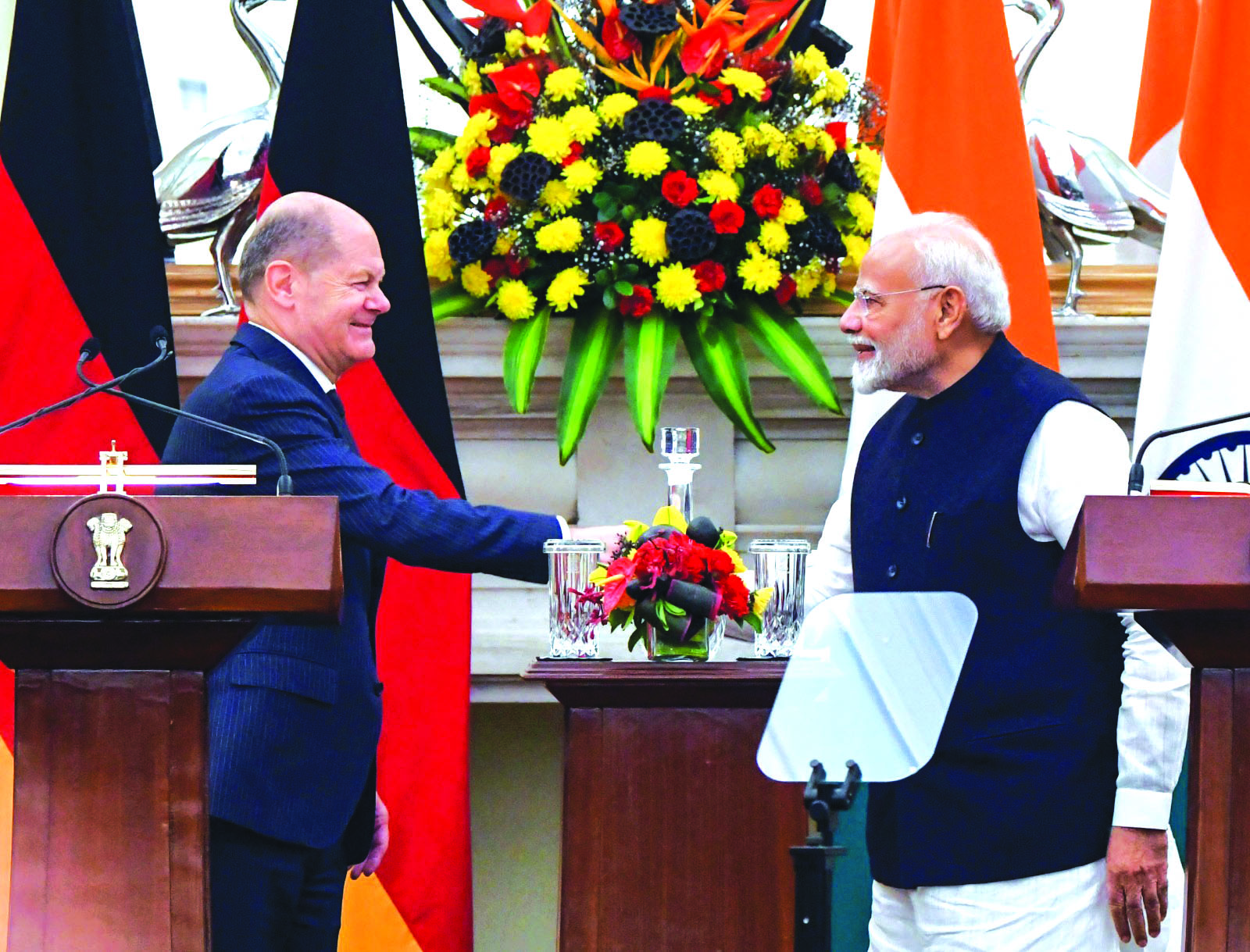India-Germany strategic partnership is emerging as a cornerstone of stability amid uncertain times. Unfussy and devoid of diplomatic embellishments, the ties have been on an upward trajectory in recent times to signal the achievement of a certain maturity. Key developments evolving around the recent visit by Chancellor Olaf Scholz have pointed to India attaining a newfound strategic importance as indicated in Berlin’s newly published “Focus on India” manual. The great value that India attaches to this strategic partnership is evidenced by Prime Minister Narendra Modi characterising the relationship as “transformational”, given its potential to serve as a “strong anchor” amid turbulent geopolitical currents.
The partnership on one hand draws strengths from converging viewpoints in the realm of technology governance and sustainable development. On the other hand, common interests also derive from the stakes both countries are looking to secure in the Indo-Pacific as they seek to constructively engage China. In a way, they have sought to de-escalate the evolving situation in the Indo-Pacific through touting their respective versions of strategic autonomy. Germany in particular has sought out avenues for diplomacy with China in the realm of science and technology or trade. Meanwhile, both countries have been striving to de-risk their critical technologies’ supply chain through setting up alternative means and ramping up domestic capacity in areas including artificial intelligence, biotechnology and semiconductors.
In this context, AI and digital economy have featured as a major area for cooperation in recent times. As such, Germany as a part of the EU and India have been pioneering distinctive, yet similar approaches to AI regulation. The similarities herein can be located within converging ethical ideas including inclusivity and human-centrality which underlie Germany’s vision on trustworthy AI and India’s Responsible AI. Moreover, AI represents an ideal area for India and Germany to form win-win arrangements that can strengthen their respective positions. Germany herein has been noted to be strong in R&D while facing eroding competitiveness in the area of applications. India’s talent base as well as strength in developing AI use cases would aptly complement Germany’s strength in research. Meanwhile, India may seek Germany’s insights and cooperation to sharpen the said talent base through skilling.
Opportunities are also aplenty in the realm of collaborative AI development and deployment. The larger AI strategies of Germany and India herein fit well within the collaborative AI paradigm that India has been pioneering as current chair of the Global Partnership on Artificial Intelligence (GPAI). With growing clarity on both the promises and perils of AI, collaborative AI is the need of the hour. In practice, this translates to diplomatic and policy making processes to be grounded in frameworks that allow for multiple stakeholders to collaborate and work towards equitable and beneficial impacts from AI.
In this regard, this partnership packs a punch with respect to harnessing AI’s potential to move the world closer to achieving SDGs. This premise can be examined in light of the growing impetus on South-South and triangular cooperation which has become integral to the partnership. Strategic discussions held in September 2024 sought to synergise bilateral efforts in development cooperation. The principles guiding such engagements in the area of environmental sustainability, energy transition and resilient infrastructure have already been outlined within the Indo-German Green and Sustainable Development Partnership which was set up in 2022. Such ventures grounded in mutual respect and inclusivity can help address developmental challenges facing the Global South.
In this regard, a growing convergence can also be noted with respect the AI-Sustainabilty nexus. On one hand, both countries have already embarked upon operationalising cooperation in this domain in 2023 and significant potential remains with respect to collaboration in environmental monitoring and verification. Meanwhile, both countries can lead a global narrative towards ensuring that the AI revolution does not accelerate climate change and its effects. They can do so by joining hands at global forums to speak out against business practices that perpetrate extractivism to widen the digital and economic divide between developed and emerging economies.
The potential for this partnership to serve as an anchor of the world order amid turbulent times draws credence from their moral credibility. Both nations have sought to serve as the voice of rationality the current US-led liberal order is managing a perceived decline in legitimacy amid growing tensions in the Indo-Pacific and the Atlantic theatres.
What makes the India-Germany partnership stick herein is their ability to match rhetoric with action, while leading by example. Whether it be in the realms of sustainable development or the governance of emerging technologies, the partnership is indeed one that is consequential and pivotal for shaping a discourse on international relations grounded in morality, ethics and above all, sustainable development.
Anupama Vijayakumar is Consultant, RIS

